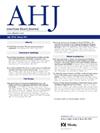房颤患者血糖控制与不良结局之间的关系:来自大型现实世界队列的证据
IF 3.5
2区 医学
Q1 CARDIAC & CARDIOVASCULAR SYSTEMS
引用次数: 0
摘要
糖尿病和房颤经常共存,但血糖控制对两种情况患者预后的影响尚未完全确定。本研究旨在比较控制不良与控制良好的糖尿病房颤患者的不良心血管和肾脏预后。方法:我们利用TriNetX研究网络(一个全球联合健康研究平台)进行了一项回顾性队列研究。心房颤动和2型糖尿病患者按血红蛋白A1c (HbA1c)水平分层:控制不良(HbA1c≥7.0%)和控制良好(HbA1c≤6.9%)。在人口统计学和临床特征的倾向评分匹配后,分析了332,060名患者的队列。主要结局包括全因死亡率、心力衰竭、心源性休克和肾脏并发症。结果分析采用风险分析和Kaplan-Meier生存分析,在5年随访期间采用风险比(HR)和95%可信区间(CI)。结果在这个倾向匹配的队列中,控制不良的糖尿病患者的全因死亡率明显高于控制良好的糖尿病患者(26.3% vs 25.6%; HR 1.070, 95% CI 1.060-1.080; p<0.001)。控制不良的糖尿病还与心力衰竭(23.1% vs 22.8%; HR 1.071, 95% CI 1.056-1.086; p<0.001)、急性肾损伤(19.8% vs 18.3%; HR 1.132, 95% CI 1.117-1.148; p<0.001)和慢性肾脏疾病(19.4% vs 17.8%; HR 1.161, 95% CI 1.145-1.178; p<0.001)的风险增加相关。结论房颤合并2型糖尿病患者血糖控制不良与死亡率增加、心力衰竭和肾脏并发症相关。这些发现强调了对这一高危人群进行最佳糖尿病管理的重要性。本文章由计算机程序翻译,如有差异,请以英文原文为准。
Association Between Glycemic Control and Adverse Outcomes in Atrial Fibrillation: Evidence from a Large Real-World Cohort
Background
Diabetes mellitus and atrial fibrillation frequently coexist, but the impact of glycemic control on outcomes in patients with both conditions remains incompletely characterized. This study aimed to compare adverse cardiovascular and renal outcomes between atrial fibrillation patients with poorly controlled versus well-controlled diabetes.
Methods
We conducted a retrospective cohort study using the TriNetX Research Network, a global federated health research platform. Patients with atrial fibrillation and type 2 diabetes were stratified by hemoglobin A1c (HbA1c) levels: poorly controlled (HbA1c ≥7.0%) versus well-controlled (HbA1c ≤6.9%). After propensity score matching for demographic and clinical characteristics, cohorts of 332,060 patients each were analyzed. Primary outcomes included all-cause mortality, heart failure, cardiogenic shock, and renal complications. Outcomes were analyzed using risk analysis and Kaplan-Meier survival analysis with hazard ratios (HR) and 95% confidence intervals (CI) over a five-year follow-up period.
Results
In this propensity-matched cohort, patients with poorly controlled diabetes demonstrated significantly higher all-cause mortality compared to those with well-controlled diabetes (26.3% vs 25.6%; HR 1.070, 95% CI 1.060-1.080; p<0.001). Poorly controlled diabetes was also associated with increased risk of heart failure (23.1% vs 22.8%; HR 1.071, 95% CI 1.056-1.086; p<0.001), acute kidney injury (19.8% vs 18.3%; HR 1.132, 95% CI 1.117-1.148; p<0.001), and chronic kidney disease (19.4% vs 17.8%; HR 1.161, 95% CI 1.145-1.178; p<0.001).
Conclusion
In patients with atrial fibrillation and type 2 diabetes, poor glycemic control is associated with increased mortality, heart failure, and renal complications. These findings highlight the importance of optimal diabetes management in this high-risk population.
求助全文
通过发布文献求助,成功后即可免费获取论文全文。
去求助
来源期刊

American heart journal
医学-心血管系统
CiteScore
8.20
自引率
2.10%
发文量
214
审稿时长
38 days
期刊介绍:
The American Heart Journal will consider for publication suitable articles on topics pertaining to the broad discipline of cardiovascular disease. Our goal is to provide the reader primary investigation, scholarly review, and opinion concerning the practice of cardiovascular medicine. We especially encourage submission of 3 types of reports that are not frequently seen in cardiovascular journals: negative clinical studies, reports on study designs, and studies involving the organization of medical care. The Journal does not accept individual case reports or original articles involving bench laboratory or animal research.
 求助内容:
求助内容: 应助结果提醒方式:
应助结果提醒方式:


